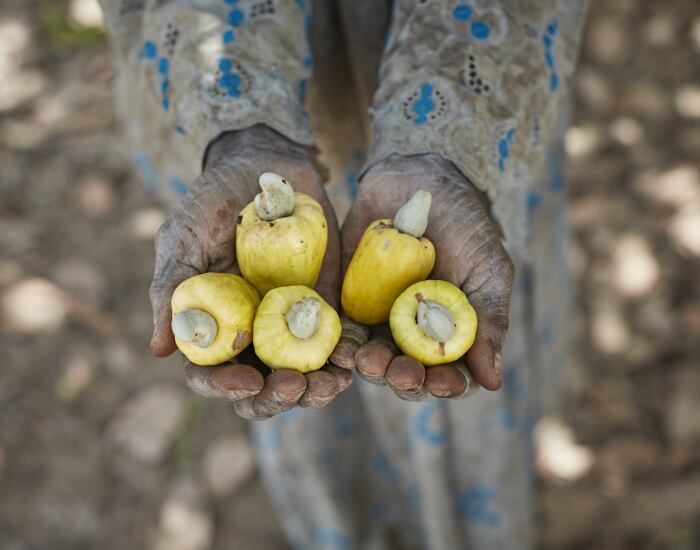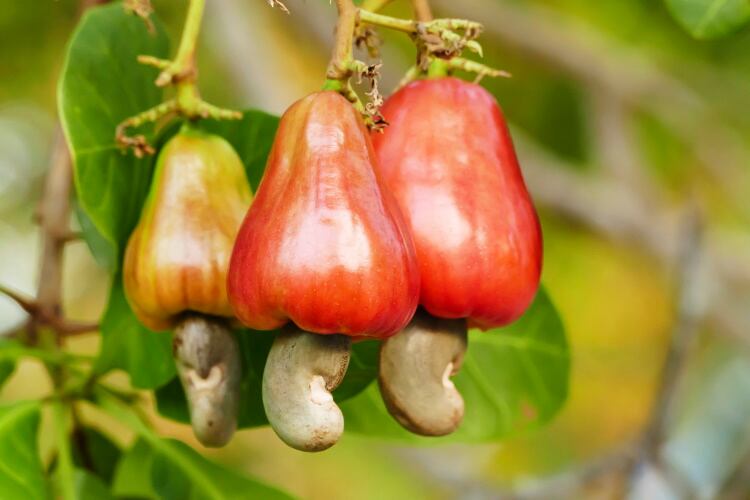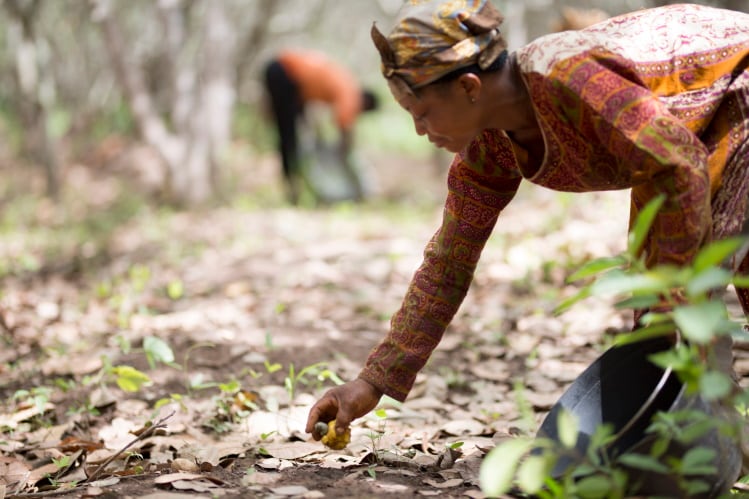Cashews are the most widely consumed nuts in Europe and North America. According to research firm Market Data Forecast, sales are expected to see a compound annual growth rate (CAGR) of 4.6% through to 2026.
The CEO of Olam Food Ingredients’ (OFI) edible nut business, Ashok Krishen, believes such forecasts are conservative. He observed that the market has seen ‘6-8% growth’ over the last decade, propelled primarily by its health and wellness credentials.
Cashews are rich in vitamins – including C, E, B1, B2, B3 and K – as well as protein, dietary fibre and antioxidants. They contain heart-healthy monounsaturated fat associated with higher levels of HDL cholesterol. And their usage occasions are expanding as demand grows beyond snacks to include inclusion in plant-based butters, cheese alternatives and vegan beverages.
But rising interest from consumers in the Global North is not feeding through to higher earnings or improved livelihoods for producers in the Global South, where cashews are primarily grown, harvested and processed.
The average cashew farmer earns around $3 per day, Krishen noted. Most are smallholders in rural areas across Africa and Asia who can’t always grow enough to feed their families, afford healthcare or send their children to school.

OFI was a ‘pioneer’ in bringing production – which often takes place in countries like India or Vietnam – to Africa, where the cashews it sources are grown. “We carried processing to Africa because cashew is 75-78% shell, which has almost zero value. Can you imagine the carbon footprint of exporting whole cashews to India to process and then exporting the [shelled and blanched] finished product to consumers in Europe or the US?”
Through the reach of its procurement and supply chain teams, OFI has supported 50,000 cashew farmers over the last decade. And now, through its new Cashew Trail programme, the company hopes to accelerate these efforts. “We want to do more for the livelihoods of farmers,” Krishen told FoodNavigator. “We owe it to ourselves to scale this programme… We urgently need to improve the economic opportunities and livelihoods of poor cashew farmers.”
The Cashew Trail: Reaching 250,000 farmers by 2030
The new initiative hopes to make a ‘measurable difference’ to the lives of 250,000 farmers in its supply chain by 2030.
One of the Trail’s primary focuses is to support higher yields through good agricultural practices. OFI believes there is potential for its farmer suppliers to increase yields by 50% in this way. This objective isn’t just pie-in-the-sky. Krishen revealed OFI has already been able to achieve such a boost with the cashew farmers its sustainability efforts have already reached. “We have increased yields by 50% from where we started for farmers who participate in our programme. We can still do more.”
Distributing saplings is an important part of the initiative. It takes four years for a sapling to start producing fruit and therefore an income. When farming families are living just above the international poverty line – and access to credit or finance is limited – such investments can seem out of reach. OFI’s sapling programme helps address this issue.
As well as improving productivity, Global Sustainability Manager Burcu Turkay said that OFI is supporting diversification of crops and incomes. “In addition to our goal of higher yields, we’d also like to support farmers by developing alternative incomes,” she explained.
To this end, OFI is distributing beehives to its suppliers or looking at ways to valorise the cashew apple. Both approaches represent a win for farmer earnings and – significantly – a win for the development of a more sustainable food system. Bees are pollinators that naturally help to support cashew yields and biodiversity while also providing honey and wax; producing compost or staples like drinks from cashew apples helps cut food waste and improve efficiency.

Krishen revealed there is opportunity for farmers to add cover crops to their operations, as well as potentially producing ‘hardly’ local crops like sesame or yams to add further income streams to their farms.
Linking economic, social and climate agenda
Building on its previous initiatives, Cocoa Compass and Coffee LENS, OFI is leveraging its digital infrastructure to build a direct relationship with farmers. Today, OFI buys just 15-20% of its volumes direct, with the remainder procured through Licensed Buying Agents.
The company wants 100% of its processing volumes to be traceable to farmer group-level by 2030.
Digital innovations like Olam Direct are important tools in achieving this – and also empowering farmers. The app provides them with access to the latest market prices and the ability to negotiate directly with OFI – rather than through buying agents – allowing farmers to retain more value for their crop.
“If we are able to increase that $3 a day, if we are able to double this, that’s a significant impact,” Krishen told us.
“Economic opportunity is very important to alleviate poverty,” Turkay added. And poverty, the global ingredient supplier believes, is a root cause of many of the other social and environmental issues the company hopes its sustainability programme will combat.
The company wants to increase access to education, Turkay continued. “Education and skills are very important because, in rural Africa, children’s access to education is limited,” she told us. The company wants to invest in schools in 1000 villages – but it isn’t just targeting children in this effort.

Adult education to improve numeracy and literacy is needed to open up access to finance and support OFI’s efforts to provide farmers with actionable insight on market prices through Olam Direct.
OFI also wants to support improved access to healthcare and nutrition through its cashew supply chain. “Malnutrition is widely seen in our supply chains. Food security is an issue,” Turkay stressed. Through Cashew Trail, OFI believes 500,000 people will benefit from improved access to nutrition by 2030.
Cashew Trail is designed to support ‘diversity and inclusion’, with a target that 30% of farmers in its directly sourced cashew communities will be female by 2030. Already, the company’s executives revealed, women make up 70-80% of the workforce in its production facilities and the group wants 30% of leadership posts to be filled by women by the end of the decade.
Climate targets are also included in OFI’s Cashew Trail agenda. The company wants to achieve a 50% reduction in GHG emissions intensity within its cashew supply chain.
“One of the greatest impacts we can have as a business is to help farmers earn a living income and help protect the environment that nurtures their trees and communities,” Krishen stressed.
Progress on Cashew Trail will be reported annually, tracked and supported by data from economic, social and environmental metrics on Olam’s sustainability insights platform AtSource. This will include carbon, water and land use footprinting which can be used by customers in their own communications.
“Our customers and stakeholders, everyone wants to help. People want to have sustainable, responsibly sourced supply chains but don’t know how. The Cashew Trail is the answer to that question,” Turkay claimed.
Coffee, cocoa and now cashews are just the start. The next target for OFI is its hazelnut supply chain. Then almonds, walnuts, pistachios, macadamias and more, the CEO of the company’s nut business revealed.




